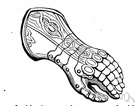gauntlet
Also found in: Thesaurus, Medical, Idioms, Encyclopedia, Wikipedia.
Related to gauntlet: throw down the gauntlet, run the gauntlet
gauntlet
a glove; a challenge: take up the gauntlet
Not to be confused with:
gantlet – a railroad track construction used in narrow places; an ordeal
Abused, Confused, & Misused Words by Mary Embree Copyright © 2007, 2013 by Mary Embree
gaunt·let 1
also gant·let (gônt′lĭt, gänt′-)n.
1. A protective glove, usually extending over some of the forearm, worn as part of medieval armor.
2. Any of various protective gloves, usually with an extended or flared cuff, as used in certain sports such as fencing and motorcycle riding, in cooking to handle hot objects, and other activities.
3. A challenge: throw down the gauntlet; take up the gauntlet.
4. A dress glove cuffed above the wrist.
[Middle English, from Old French gantelet, diminutive of gant, glove, from Frankish *want.]
gaunt·let 2
also gant·let (gônt′lĭt, gänt′-)n.
1.
a. A form of punishment or torture in which people armed with sticks or other weapons arrange themselves in two lines facing each other and beat the person forced to run between them.
b. The lines of people so arranged.
2.
a. An arrangement of two lines of menacing or demanding people or things through which one must pass: moved through a gauntlet of shouting reporters.
b. A series of difficult or trying experiences: survived the gauntlet of adolescent humiliations.
[Alteration (influenced by gauntlet) of gantlope, from Swedish gatlopp : gata, lane (from Old Norse; see ghē- in Indo-European roots) + lopp, course, running (from Middle Low German lōp).]
Word History: The two words spelled gauntlet may share associations with medieval violence, but they have separate origins. The word gauntlet used in the idiom to throw down the gauntlet comes from the Old French word gantelet, a diminutive of gant, "glove." (The idiom makes reference to the medieval custom of throwing down a glove in challenging an adversary to combat.) The gauntlet used in to run the gauntlet is an alteration of the earlier English form gantlope, which came from the Swedish word gatlopp, a compound of gata, "lane," and lopp, "course," a word related to lope and leap. The Swedish word for this traditional form of punishment, in which two lines of people beat a person forced to run between them, probably became known to English speakers as a result of the Thirty Years' War. Sweden played a leading role in the coalition of Protestant countries that fought against Spain and the Holy Roman Empire, and at the end of the war, in 1648, the Swedish empire emerged as a great power of Europe. It was during this period of expanding Swedish influence that gatlopp entered English. It seems, however, that from the moment English speakers borrowed the word, they inserted an n into the pronunciation of gatlopp—in the earliest known attestation of the word in English, dating from 1646, it is spelled gantelope. The English word was then influenced by the spelling of the other gauntlet, "a protective glove," eventually leading to the identical spellings used today.
American Heritage® Dictionary of the English Language, Fifth Edition. Copyright © 2016 by Houghton Mifflin Harcourt Publishing Company. Published by Houghton Mifflin Harcourt Publishing Company. All rights reserved.
gauntlet
(ˈɡɔːntlɪt) organtlet
n
1. (Arms & Armour (excluding Firearms)) a medieval armoured leather glove
2. (Clothing & Fashion) a heavy glove with a long cuff
3. take up the gauntlet to accept a challenge
4. throw down the gauntlet to offer a challenge
[C15: from Old French gantelet, diminutive of gant glove, of Germanic origin]
gauntlet
(ˈɡɔːntlɪt)n
1. (Historical Terms) a punishment in which the victim is forced to run between two rows of men who strike at him as he passes: formerly a military punishment
2. (Historical Terms) to suffer this punishment
3. to endure an onslaught or ordeal, as of criticism
4. a testing ordeal; trial
5. (Railways) a variant spelling of gantlet11
[C15: changed (through influence of gauntlet1) from earlier gantlope; see gantlet1]
Collins English Dictionary – Complete and Unabridged, 12th Edition 2014 © HarperCollins Publishers 1991, 1994, 1998, 2000, 2003, 2006, 2007, 2009, 2011, 2014
gaunt•let1
(ˈgɔnt lɪt, ˈgɑnt-)n.
1. a mailed glove worn with a suit of armor to protect the hand.
2. a glove with an extended cuff.
3. the cuff itself.
Idioms: 1. take up the gauntlet, to accept a challenge to fight.
2. throw down the gauntlet, to challenge someone to fight.
[1375–1425; late Middle English gantelet < Middle French, diminutive of gant glove < Germanic *want-; compare Old Norse vǫttr]
gaunt′let•ed, adj.
gaunt•let2
(ˈgɔnt lɪt, ˈgɑnt-)n.
1. a former punishment, chiefly military, in which the offender was made to run between two rows of men who struck at him with switches or weapons as he passed.
2. the two rows of men administering this punishment.
3. an attack from two or all sides.
4. a severe test; ordeal.
Idioms: run the gauntlet, to suffer severe criticism or tribulation.
Also, gantlet (for defs. 1, 2, 4). [1670–80; alter. of gantlope]
Random House Kernerman Webster's College Dictionary, © 2010 K Dictionaries Ltd. Copyright 2005, 1997, 1991 by Random House, Inc. All rights reserved.
ThesaurusAntonymsRelated WordsSynonymsLegend:
Switch to new thesaurus
| Noun | 1. |  gauntlet - to offer or accept a challenge; "threw down the gauntlet"; "took up the gauntlet" gauntlet - to offer or accept a challenge; "threw down the gauntlet"; "took up the gauntlet"challenge - a call to engage in a contest or fight |
| 2. |  gauntlet - a glove of armored leather; protects the hand gauntlet - a glove of armored leather; protects the handbody armor, body armour, cataphract, coat of mail, suit of armor, suit of armour - armor that protects the wearer's whole body glove - handwear: covers the hand and wrist | |
| 3. | gauntlet - a glove with long sleeve glove - handwear: covers the hand and wrist | |
| 4. | gauntlet - a form of punishment in which a person is forced to run between two lines of men facing each other and armed with clubs or whips to beat the victim corporal punishment - the infliction of physical injury on someone convicted of committing a crime |
Based on WordNet 3.0, Farlex clipart collection. © 2003-2012 Princeton University, Farlex Inc.
gauntlet
nounthrow down the gauntlet issue a challenge, challenge They have thrown down the gauntlet to their competitors.
Collins Thesaurus of the English Language – Complete and Unabridged 2nd Edition. 2002 © HarperCollins Publishers 1995, 2002
Translations
ajojahtikujakujanjuoksutaisteluhansikas
gauntlet
[ˈgɔːntlɪt] N [of knight] → guantelete m, manopla f; [of motorcyclist etc] → guante mto run the gauntlet (Mil, Hist) → correr baquetas
he had to run a gauntlet of abuse as he arrived for the meeting → tuvo que aguantar una sarta de improperios a su llegada a la reunión
to throw down/take up the gauntlet → arrojar/recoger el guante
Collins Spanish Dictionary - Complete and Unabridged 8th Edition 2005 © William Collins Sons & Co. Ltd. 1971, 1988 © HarperCollins Publishers 1992, 1993, 1996, 1997, 2000, 2003, 2005
gauntlet
[ˈgɔːntlɪt] n [motorcyclist] → gant mpl (à crispin)
to throw down the gauntlet (= make a challenge) → jeter le gant
to pick up the gauntlet (= accept challenge) → relever le gant
to throw down the gauntlet (= make a challenge) → jeter le gant
to pick up the gauntlet (= accept challenge) → relever le gant
to run the gauntlet of → braver
She was forced to run the gauntlet of 300 jeering demonstrators → Elle avait dû braver les huées de 300 manifestants.
She was forced to run the gauntlet of 300 jeering demonstrators → Elle avait dû braver les huées de 300 manifestants.
Collins English/French Electronic Resource. © HarperCollins Publishers 2005
gauntlet
1n
(of armour) → Panzerhandschuh m; to throw down/pick up or take up the gauntlet (fig) → den Fehdehandschuh hinwerfen/aufnehmen
gauntlet
2n to run the gauntlet (fig) → Spießruten laufen; to (have to) run the gauntlet of something → einer Sache (dat) → ausgesetzt sein
Collins German Dictionary – Complete and Unabridged 7th Edition 2005. © William Collins Sons & Co. Ltd. 1980 © HarperCollins Publishers 1991, 1997, 1999, 2004, 2005, 2007
gauntlet
[ˈgɔːntlɪt] n (of knight) → guanto d'armatura, manopola; (of motorcyclist) → guantoto run the gauntlet of an angry crowd (fig) → sottoporsi al fuoco di fila di una folla ostile
to throw down the gauntlet → gettare il guanto
Collins Italian Dictionary 1st Edition © HarperCollins Publishers 1995